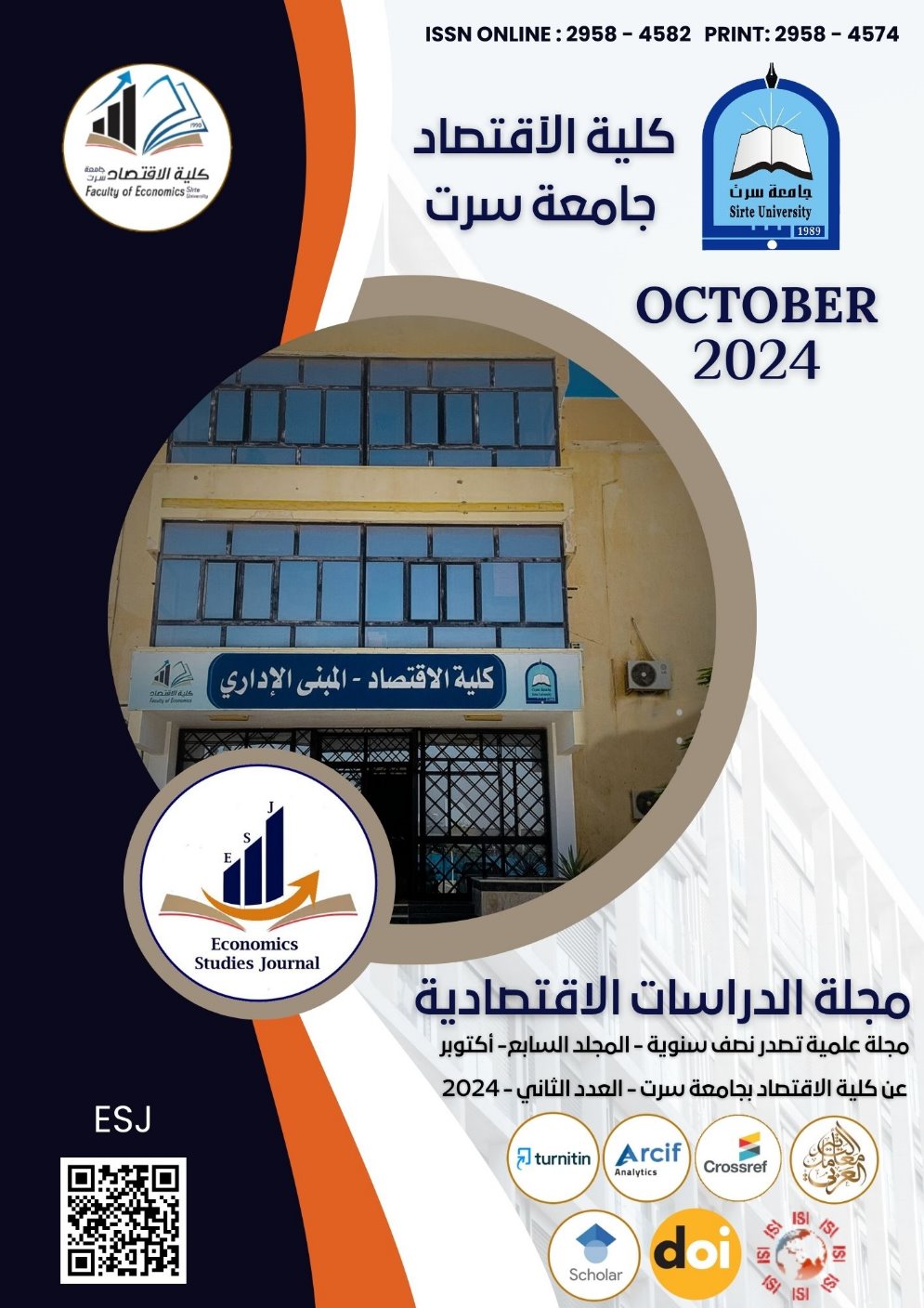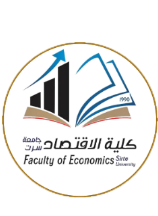دور المحاسبة السحابية في تحسين مهنة المحاسبة من وجهة نظر أعضاء هيئة التدريس (دراسة ميدانية بقسم المحاسبة كلية الاقتصاد جامعة المرقب)
DOI:
https://doi.org/10.37375/esj.v7i2.2950الكلمات المفتاحية:
المحاسبة السحابية، الأداء المالي، مهنة المحاسبةالملخص
تهدف الدراسة إلى التعرف على دور المحاسبة السحابية في تحسين مهنة المحاسبة في ليبيا، والتعرف على الوضع الحالي للمحاسبة السحابية في ليبيا، بالإضافة إلى مدى إدراك الاكاديميين في ليبيا لمفهوم المحاسبة السحابية وأهدافها وأبعاد تطبيقها في ليبيا، وقد تمثلت مشكلة الدراسة في سؤال رئيسي: ما دور المحاسبة السحابية في تحسين مهنة المحاسبة من وجهة نظر أعضاء هيئة التدريس بقسم المحاسبة كلية الاقتصاد جامعة المرقب؟، ولتحقيق أغراض الدراسة فقد تم استخدام المنهج الوصفي والتحليلي وذلك باستخدام الأساليب الإحصائية لعرض وتحليل نتائج الدراسة, وخلصت الدراسة إلى العديد من النتائج أهمها: للأكاديميين إدراك بمميزات وخصائص المحاسبة السحابية، لدورها في تحسين مهنة المحاسبة، وذلك من خلال مساهمتها في مساعدة المحاسب على اعداد الحسابات بأقل وقت وأقل جهد، وإمكانية الوصول إلى المعلومات في أي وقت ومن أي مكان للأكاديميين إدراك بأهمية المحاسبة السحابية وأهدافها وأبعاد تطبيقها، لدورها في تحسين مهنة المحاسبة، وذلك من خلال تطبيق المحاسبة السحابية يزيد من ثقة ورضا مستخدمي المعلومات، بالإضافة إلى إن تطبيق المحاسبة السحابية يساعد المحاسبين على الابتكار والابداع وذلك من خلال تطوير مهاراتهم، وقدمت الدراسة عدة توصيات منها: ضرورة الاعتماد على برمجيات ناجحة تضمن أمن وسلامة البيانات المتعلقة بالعملاء ومنع اختراقها أو الاطلاع عليها، والعمل على تطوير المناهج الدراسية في الجامعات الليبية لتواكب التطورات التقنية وبما يساهم في التعرف على مفهوم ومميزات المحاسبة السحابية، ونشر الوعي بأهمية ومزایا المحاسبة السحابية وتطبيقاتها المختلفة وجدوى استخدامها.
المراجع
أولاً: المراجع باللغة العربية.
أحمد، إيمان ابراهيم (2020)، "العوامل المؤثرة على توجه الشركات لاعتماد على المحاسبة السحابية: دراسة تطبيقية على الشركات المساهمة"، مجلة الفنون والأدب وعلوم الانسانيات والاجتماع، العدد 54، يوليو، الامارات، ص 164-178.
أبوعبيلة، سورانا محمد، (2021)، أثر استخدام نظام المحاسبة السحابية على جودة المعلومات المحاسبية في مستشفيات الخدمات الطبية الملكية الأردنية، رسالة ماجستير غير منشورة، جامعة أل البيت، الأردن.
السمرائي، سلوى الأمين والكعيدي، عبد الستار عبد الجبار (2012)، "مستقبل ذكاء الأعمال في ظل ثورة الحوسبة السحابية"، كلية الاقتصاد والعلوم الإدارية، جامعة الزيتونة الأردنية، المؤتمر العلمي السنوي الحادي عشر.
الفلاح، فاطمة مفتاح، رفيع، فاطمة إبراهيم (2022)، "فرص وتحديات اعتماد المحاسبة السحابية في شركتي المدار وليبيانا للاتصالات: دراسة ميدانية"، مجلة الاسكندرية للبحوث العلمية، كلية التجارة، جامعة الاسكندرية، المجلد السادس، العدد الثالث، سبتمبر، مصر، ص 84-104.
المطيري، منى بنت عائض (2014)، أثر التدريس باستخدام الحوسبة السحابية في التحصيل الدراسي والدافعية نحو التعلم لدى طالبات، رسالة ماجستير غير منشورة، كلية التربية، الرياض، جامعة الملك سعود، السعودية.
بو غزالة أحمد مسعودة، سعودي شيحة، مطو فايزة، (2021)، المحاسبة السحابية والعوامل المؤثرة على اعتمادها، رسالة ماجستير غير منشورة، كلية العلوم الاقتصادية والتجارية وعلوم التيسير، جامعة الشهيد حمه لخضر، الجزائر.
سلطاني, عمار; حليمي, يسين، (2020)، أثر تطبيق المحاسبة السحابية على المردودية المالية للمؤسسة الاقتصادية: دراسة حالة مؤسسة اتصالات الجزائر، رسالة ماجستير غير منشورة، كلية العلوم الاقتصادية والتجارية وعلوم التيسير، جامعة العربي التبسي، الجزائر.
شتاوة، وسام عزيز، والشمري، حسين كريم (2019)، "المحاسبة السحابية افق جديد لتنظيم العمل المحاسبي"، مجلة كلية مدينة العلم الجامعة، المجلد 11، العدد 1، العراق، ص 1-17.
شوقي، أحمد، وتوفيق، محمد (2023)، "نضج الصناعة في تطبيق المحاسبة السحابية كمتغير معدل للعلاقة بين معلومات المحاسبة السحابية وقرار الاستثمار في أنظمتها: دراسة تجريبية"، مجلة البحوث المحاسبية، كلية التجارة، جامعة طنطا، العدد الرابع، ديسمبر، مصر، ص 768-845.
فائز، رحاب أحمد (2013)، "نظم الحوسبة السحابية مفتوحة المصدر: دراسة تحليلية مقارنة، المجلة العراقية لتكنولوجيا المعلومات، المجلد الخامس، العدد الثاني، العراق، ص 17-41.
مهدي، حسام محمد، التميمي، أمل سلمان (2020)، "إمكانية توجه الشركات نحو المحاسبة السحابية دراسة تطبيقية في شركات السياحة والسفر العراقية"، مجلة وارث للبحث العلمي، جامعة وارث الأنبياء العلمية، المجلد الثاني، العدد الأول، العراق، ص 137-151.
هنية، عبدالله محمد، (2023)، "مدي تطبيق واعتماد المحاسبة السحابية في شركة سرت لإنتاج وتصنيع النفط والغاز: دراسة ميدانية"، الجمعية العلمية للدراسات والبحوث التطبيقية، مجلة العلوم التجارية والبيئية، المجلد الثاني، العدد الثاني، أكتوبر، مصر، ص 160-174.
ثانياً: المراجع باللغة الانجليزية.
Maravi, P. S., & Modi, S.(2017) Cloud Accounting–A New Concept in the Accounting World.
Sobhan, R. (2019). The Concept of Cloud Accounting and its Adoption in Bangladesh.
Dandago K. I. and Rufai A. S., (2014), Information Technology and Accounting Information System in the Nigerian Banking Industry, Journal of Asian Economic and Financial Review, Vol. 4 No. 5:655670.
Özdemir, S., & Elitaş, C. (2015). The Risks of Cloud Computing in Accounting Field and the Solution Offers: The Case of Turkey.
Mariya, S. (2011). “Cloud computing – an advanced e-learning Platform of school education. Institute of information technologies and Learning tools, Kyiv, Ukraine.
Kristandl, et.al, (2014), "Management Accounting and Management Control – Cloud Technology Effects and a Research Agenda", Working Paper, ACMAR.
Prichici and Ionescu, (2015), "Cloud Accounting: A New Paradigm of Accounting Policies", Practical Application of Science (SEA), Vol. III, No.1.
Onyal, )2016). "The Use of Cloud Computing and Accounting Packages for Corporate Business Transactions in Nigeria: an Explorative Study", Journal of Business and management, Vol.18, No.7. http://www.iosrjournals.org.
Christauskas, C. Miseviciene, R., (2012), "Cloud -Computing Based Accounting for Small to Medium Sized Business",Inzinerine Ekonomika-Engineering Economics, vol 23, No 1.
Hung, BQ. Hoa, TA. Hoai, TT. and Nguyen, NP., (2023), "Advancement of cloud-based accounting effectiveness, decision-making quality, and firm performance through digital transformation and digital leadership: Empirical evidence from Vietnam", Heliyon, by journal homepage: www.cell.com/heliyon.
Dmitriy V. Chulkov & Steve Cox & Joungy Kim ،.(2021), "Financial Impact of Moving to Cloud Computing", Journal of Applied Business &Economics, Vol. 23 Issue 1, PP 227-235.
Uma Sekaran (2003), Research Methods For Business, A Skill - Building Approach, Fourth Edition, Southern Illinois University at Carbondale.




































